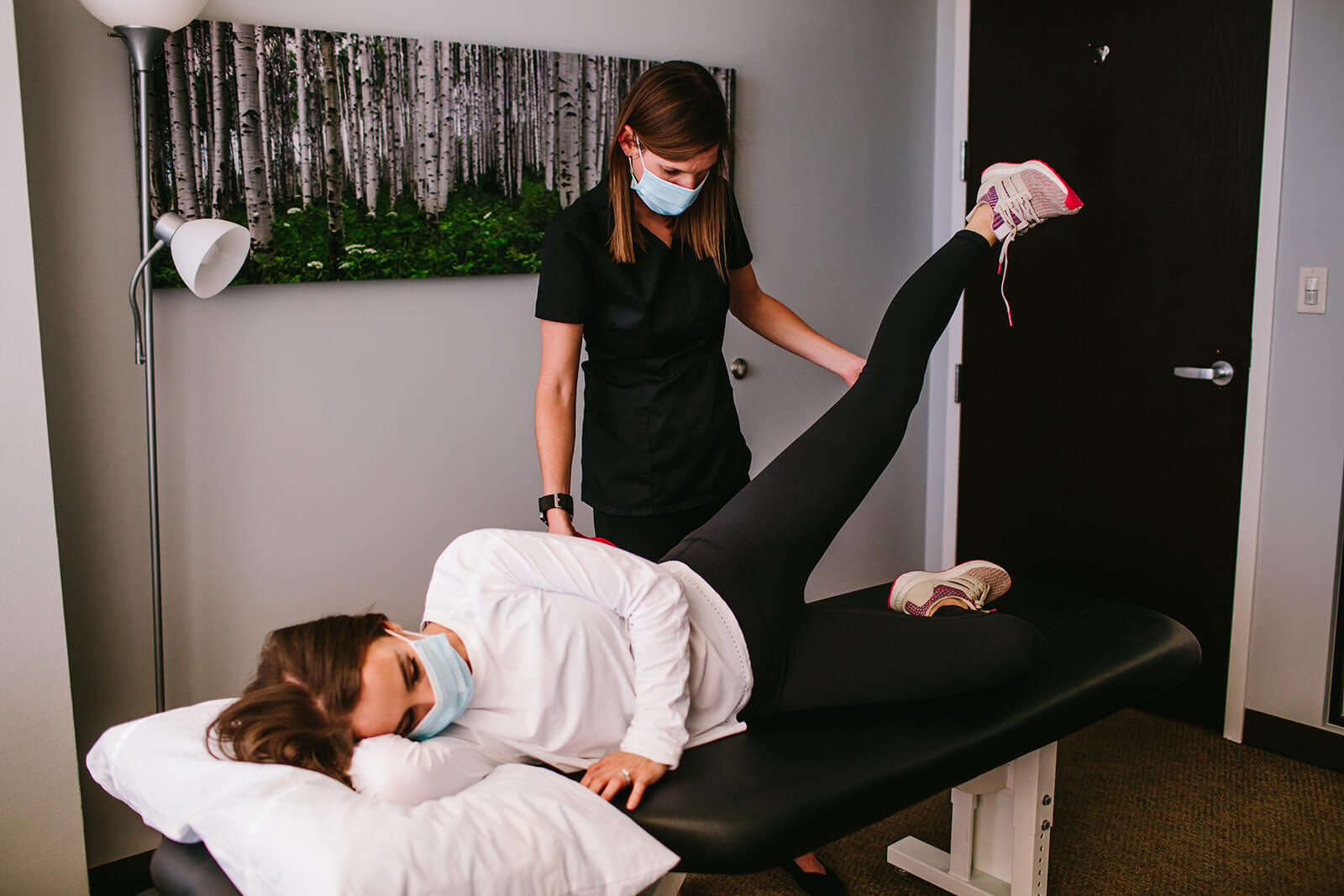Physical therapy is a unique approach to treatment. As such, it’s common for patients to have a lot of questions before they begin their first Denver physical therapy session.
In this blog, we’re reviewing some of the most common questions that first-time physical therapy patients may have to help you learn more about this safe and effective type of care. What should I wear to physical therapy? Will my health insurance cover the sessions? And of course, does physical therapy hurt? Here, we’re answering all these questions and more so you can discover the amazing benefits of physical therapy.
At Total Physical Therapy, we understand that every path to recovery is unique. That’s why we develop personalized treatment plans based on your specific healthcare needs and goals. We offer close, one-on-one access with Denver’s best physical therapists to speed up your recovery and improve your overall fitness. If you’re experiencing a musculoskeletal injury, our hands-on, evidence-based therapy can help.
With open and consistent communication, advanced therapy techniques, and an entire healthcare staff dedicated to the unique path of your recovery, Total PT can get you back to the life you love.
Who is Physical Therapy For?
While one might usually imagine a Denver physical therapy patient as someone who is recovering from a major accident or injury, that’s just the beginning of who physical therapy can help. From minor injuries to extensive ones, physical therapy provides a safe, holistic, and effective form of treatment for patients of all ages.
If you’re experiencing one of the following health issues, physical therapy could be right for you. In some cases, physical therapy may be recommended to be used in tandem with other treatments, such as dry needling in Denver. Speak with your doctor to see if physical therapy can help you recover from:
- Sports-related injuries.
- Car accident injuries.
- Chronic pain.
- Neck pain or stiffness.
- Cardiac rehabilitation.
- Arthritis.
- Work-related injuries.
- Cancer recovery.
- Muscles strains and sprains.
- Joint mobility issues.
- Pre and post-surgical care.
- Respiratory problems.
- Balance problems.
What Do I Wear to Physical Therapy?
Physical therapy is much more than simply visiting a doctor and having them diagnose an illness or injury. Physical therapy is a hands-on type of care, and once your program begins, there will be physical therapy exercises and stretches that involve movement and flexibility. Therefore, it’s recommended that you wear loose, comfortable clothing. Think about wearing an outfit similar to what you’d wear to the gym or on a jog.
The type of injury you’re recovering from may also help dictate what you should wear for your physical therapy sessions. If you’re recovering from an upper-body injury, consider wearing a loose, baggy shirt or tank top to allow for easy shoulder and arm movement. For lower-body injuries, shorts work well. Sneakers and socks are sufficient for footwear.
Does Physical Therapy Hurt?
Another common question that almost every first-time patient will have on their mind: does this type of therapy hurt? Physical therapy does not hurt the patient—after all, these exercises and stretches are designed to relieve pain. However, during some physical therapy programs, you may experience some mild pain or discomfort as you work to heal and recover from your injury. This is often an essential part of the recovery process.
If you do experience pain during your physical therapy, don’t hesitate to communicate with your physical therapist. They’ll do everything they can to ensure that your treatment program is as comfortable and as safe as possible. If a certain exercise does cause you pain, they’ll be able to modify your program to provide maximum results with minimal pain throughout.
How Long Does Physical Therapy Take?
This question can be a bit complex to answer. Not even the most experienced physical therapist can honestly provide an exact answer. The length of your physical therapy program will depend on various factors, such as the extent of your injuries, your recovery speed, healthcare history, and the dedication you put into your recovery.
Since a physical therapist can’t provide 24/7 care at all times, most physical therapy programs include exercises that must be completed at home. If a patient fails to complete their own exercises and stretches at home, the recovery process may take longer.
Thus, the length of a program will vary from patient to patient. While some may be able to recover from their injuries within weeks, some patients may require months or longer to achieve a full and long-lasting recovery. Some patients, especially athletes, may consider receiving regular physical therapy to help them achieve peak physical performance and even prevent future injuries.
Will My Health Insurance Cover Physical Therapy?
For most patients, the answer is yes. The majority of health insurance plans will cover your physical therapy sessions. Whether provided through a private insurance plan, Medicare, or worker’s compensation, there’s a good chance that your physical therapy will be covered. But this doesn’t always mean there will be zero out-of-pocket costs.
Some insurance plans may require patients to provide a copay for the sessions. This amount will vary based on the specifics of your coverage. Additionally, some insurance plans may only allow you to work with physical therapists in their specific network. Some may also limit the number of physical therapy sessions you can have covered, usually on a monthly or annual basis. If you have any questions about your healthcare coverage and physical therapy, reach out to your insurance provider. Our friendly staff can also help you determine whether or not you’ll be covered for this care.
Conclusion – What to Wear to Physical Therapy + Answers to Other Common Physical Therapy Questions
Before beginning your first physical therapy session, it’s natural to have a lot of questions. Compared to other types of treatment, such as medication, physical therapy is a hands-on and engaging form of therapy that requires the work and dedication of both your physical therapist and you—the patient.
No matter your age, fitness level, or health condition, physical therapy could be an effective type of care. Physical therapy works with your body to help you recover faster, restore mobility, provide relief from pain, and even give a boost to your mental health.
Total PT is a premier physical therapy office serving patients in the Denver metro area. With a unique and personalized approach to care, we offer unmatched one-on-one access to Denver’s top physical therapists. If you’ve been in a car accident, require assistance recovering from a sports injury, or need post-surgical care, our physical therapy staff is here to help. With our advanced and evidence-based treatments, we can provide quick pain relief, improve your mobility, and even help you prevent future injuries. With our unique, holistic approach to care, our physical therapy experts provide personalized care for your total health.
Contact us today or call us at 303-758-5060 to schedule an appointment for your initial consultation. At Total PT, we can get you back to the lifestyle you love.




